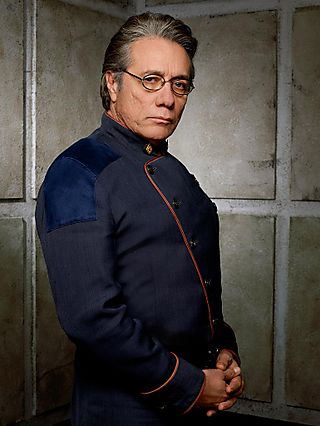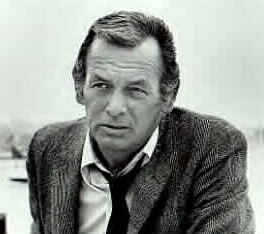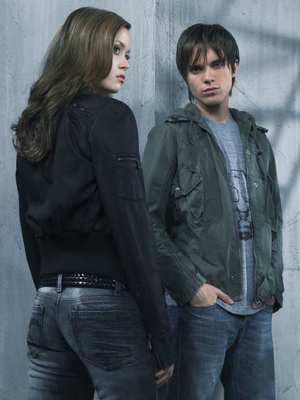 Lee Goldberg
Lee Goldberg
Lost in Space Main Titles Reimagined
Someone has done a cool update of the classic LOST IN SPACE second season main title and posted it on YouTube. Here it is.
Another guy took a shot at remastering the season three titles and they're pretty impressive, too.
Going Back to the Napkin
Here's a blast-from-the-past that I stumbled on tonight… Tod and I interviewing each other for Beatrice.com back in 2005.
Tod: How is it that we both grew up in the same house and yet we both write such dramatically different things? People always ask me if I see similarities in our work, but I rarely do, other than that we are prodigious killers of fictional people and that we’ve both set novels in the same exact place (Loon Lake, WA). Why do you think we write such different kinds of books?
Lee: I’m still trying to figure out the Loon Lake thing. It’s like our family’s collective unconscious (our uncle also set part of his novel at Loon Lake). You don’t know this, but I also have fifty pages of a torrid, James M. Cain-esque novel set at Loon Lake that I started writing three or four years ago and never finished. Before I gave up on it, I scrawled the key plot points on a napkin in case I ever wanted to get back to it. It was as if I knew I was going to abandon it even before I did. Well, I didn’t entirely abandon it. I think about it every few months and I lifted a paragraph or two from it for The Man With the Iron-On Badge, so those fifty pages weren’t a complete waste.
But to answer your question, we write different books because we are different people. Given a choice between reading a literary novel or a thriller, I’ll choose the thriller most of the time. You’ll choose the literary fiction. That’s not to say I don’t read non-crime/non-genre novels…I do. We share some of the same favorite authors. But I love thrillers, mysteries, and westerns—basically, escapist fiction—with a passion that you clearly do not.
Maybe it has to do with TV. I was a voracious reader as a kid, but I also grew up watching a lot more TV than you did and developing a true love of the four-act structure. Maybe watching all that TV shaped what I expect from a story…a kind of narrative engine, conflict, and personal stakes that aren’t always found in literary fiction. Or I’m just superficial.
As it turns out, I pulled out that napkin the other day and am actually thinking about tackling that book now.
Lightsword Becomes a Vanity Press
Now that Lightsword Publishing has gone bankrupt, crippled by revelations of fraud and incompetence, disgraced "publisher" Linda Daly has reconstituted the company as a vanity press operation. Here's what she's written on her Lightsword Digital site:
Currently, LSP Digital is NOT accepting submissions. In early Spring
of 2009 we look forward in updating our guidelines for submission
requirements along with a complete outline of any and all fees for
publishing with LSP Digital, LLC.
Now that's chutzpah.
Hosing Yourself
Author John Gilstrap doesn’t understand the desire to self-publish at all.
I don’t understand why people would pay the thousands of dollars necessary to make self-publishing happen. If the goal is to get one’s book into the hands of friends and family, a Kinko’s would serve as well as a self-publishing house. If the desired audience is bigger than that, the writer is hosed. Selling a hundred copies to people who all know where you live is not really publishing, is it? Isn’t the point to sell not tens of copies, but tens of thousands of copies? It’s impossible to get that kind of distribution without a legitimate publisher.
He’s right, of course. But some argue that pros like John are looking at this from the wrong angle. Some authors aren’t interested in making any money on their art, they are in it for the creative expression. Well, if that’s the case, why not just post the book for free download on a blog?
doesn’t understand why anyone would self-publish.
Tie-ins: The Final Frontier
Author Vonda McIntyre blogs about breaking-in as a tie-in writer with her STAR TREK novels and the snobbery she encountered.
Back in the 1980s, I wrote a bunch of Star Trek novels. I thoroughly enjoyed writing them. Pretty much the only drawback was that some of my colleagues took exception to my polluting my precious bodily fluids with evil tie-in novels. You’d’ve thought they believed they had to save my soul, blathering about the improvement in my moral character that would result if instead I took an honest job as a waitress.
But mostly she shares a lot of amusing and interesting anecdotes about her tie-in days in the post and subsequent comments. Her post sparked a debate over at Metafilter and at John Scalzi's blog. He writes, in part:
With very few exceptions, media tie-in SF outsells original SF, often by a significant amount. Now, we can argue about why this is and whether this is a good thing for the genre or not, but at the end of the day, it’s a fact and it’s something authors give serious consideration to, in terms of its value to their overall career. […]I don’t write tie-in SF for my own reasons, but it’s not to say I wouldn’t if the right project came along. I have quite a number of friends who do or have written tie-ins, and you know what, when all is said and done they’re generally getting paid well to do work they love in universes they’re fans of, for audiences who well appreciate their efforts. Maybe some people want to crap all over that and call them hacks. I heartily raise a middle finger at them.
Obviously, I agree. I read some of the comments on Scalzi's blog and at Metafilter and the argument some folks are making against tie-ins is that they are so successful that they are squeezing better, original books off the shelves. It's a disingenuous and dumb argument. The fact is if the non-tie-in is selling well, it won't be pushed off the shelf by the latest STAR TREK novel. The reason the tie-ins are on the shelf in the first place is because people are buying them. If there wasn't a voracious market for them, they wouldn't exist.
You’ll Thank Me Later
David Breckman, a writer-producer-director on MONK, has started blogging.
My new blog. Question: Can I possibly keep this going? Answer: If the entries are brief enough, I think I have a shot. Toward that end I am determined to keep each post down to 350 words or less.
One thing you can count on is an inside look at the making of MONK, like this post about a recent visit to the New Jersy writers room by Tony Shalhoub, USA chief Jeff Wachtel, and co-exec producer Randy Zisk:
We were mainly in the writers' room, all of us sitting around the big table as Andy Breckman (my brother and, as MONK's creator and showrunner, also my boss) walked the three of them through most of the upcoming episodes of our eighth and final season. Andy gave them a detailed description of the first nine shows, thumbnail summaries of five or six more — the ones we haven't "broken" yet — and not so much as a peep about the finale. […] Andy held forth. We writers chimed in occasionally. And Randy, Tony and Jeff all scribbled continuousy in their legal pads, asking good questions and (bless their hearts) laughing in all the right places. […] Andy joked that because this was to be MONK's final season it was also surely Jeff Wachtel's last visit to New Jersey ever. Jeff laughed as hard as the rest of us but did not contradict him.
You should visit his blog regularly. You'll thank me later.
The Mail I Get
I am not a publisher, editor, or studio chief. I don't buy books or screenplays. And yet I am constantly being pitched manuscripts and screenplays by aspiring writers. Here's the introduction from a particularly inept unsolicited pitch that I got today:
Mr. Goldbrg,
My name is Theodore Chambers, and I am an aspiring author. No, I take that back. I AM an author.
Just not published yet! I have just completed my first novel, and am sending feelers out to highly selected
group of publishing industry luminarios to invite them (you!) to take your seasoned red pen to my
new manuscript and mark away, giving me all your honest thoughts on pacing, character, setting,
theme, and plot devices. I know in my heart of hearts that I am destined to be a famous author,
and I think you will see the potential here for joining me on this journey. Just imagine if Nora Roberts
had come to you, Mr. Goldbrg, and said please look at my first manuscript. If you had accepted
that challenge, you would be spoken of today in even greater tones than you already are. Here is your chance
to make up for missing out on that!
Let me see if I have this straight — since I didn't have the opportunity to read Nora Roberts' first manuscript and be spoken of in "even greater tones" than I already am, I should now devote days of my time to reading, editing, and critiquing a manuscript from a total stranger who can't even spell my name? Gee, how could I resist an opportunity like that!? But wait, there's more:
Please let me know ASAP if you would like to see the manuscript, or perhaps if you are already intrigued enough
we can possibly discuss potential agents or editors. I am more than willing to cut you in on a finder's fee if anything
comes from you.
How generous. Needless to say, I won't be asking to read his "soon-to-be published novel titled THE ARGOSY AGONY." Clearly, this "destined to be famous author" has simply spammed every established novelist with a blog or website (his "highly selected group of publishing industry luminarios") with his solicitation, which includes a lengthy (and awful) plot summary that's riddled with typos and miss-spellings. The sad thing is that he doesn't realize what a bad impression he's creating among the "luminarios" that he believes that he's destined to join…and how self-destructive his solicitation actiually is.
Lazy Days and Beloved Characters

I finished writing my latest MONK novel the other day and I felt like lazing around. I’ve had a lot on my mind lately and after writing a book I didn’t feel much like reading one. So I vegged out on television…some new, some old.


Watching HARRY O, ROCKFORD and THE OUTSIDER, I realized what those old shows had over those two, recent episodes of GALACTICA and TERMINATOR. Character. Keep in mind, GALACTICA and TERMINATOR are two of my favorite shows (well, they were). But, at the risk of sounding like an old coot blogging from his bungalow at the Motion Picture Home, I think that too often shows today confuse angst with character, dread with depth, misery with complexity. A character doesn’t have to be in endless spasms of self-loathing, denial, heart-break and agony to be someone worth watching or caring about. That’s cheap and easy “complexity” for a writer, it’s writing a character rather than creating one…and it’s a beating for the audience. Characters are more than the sum of their pain, anguish and loss…and their capacity for cruelty to themselves and others. It’s not superficial or weak writing to explore more subtle conflicts…and to season them with humor, compassion, vulnerability, and some joy. There are people I love very much who are going through very hard times…and yet they haven’t lost their sense of humor or their ability to find joy in their lives, even in their darkest moments. If anything, it’s that capacity for humor and joy that is seeing them through it.
